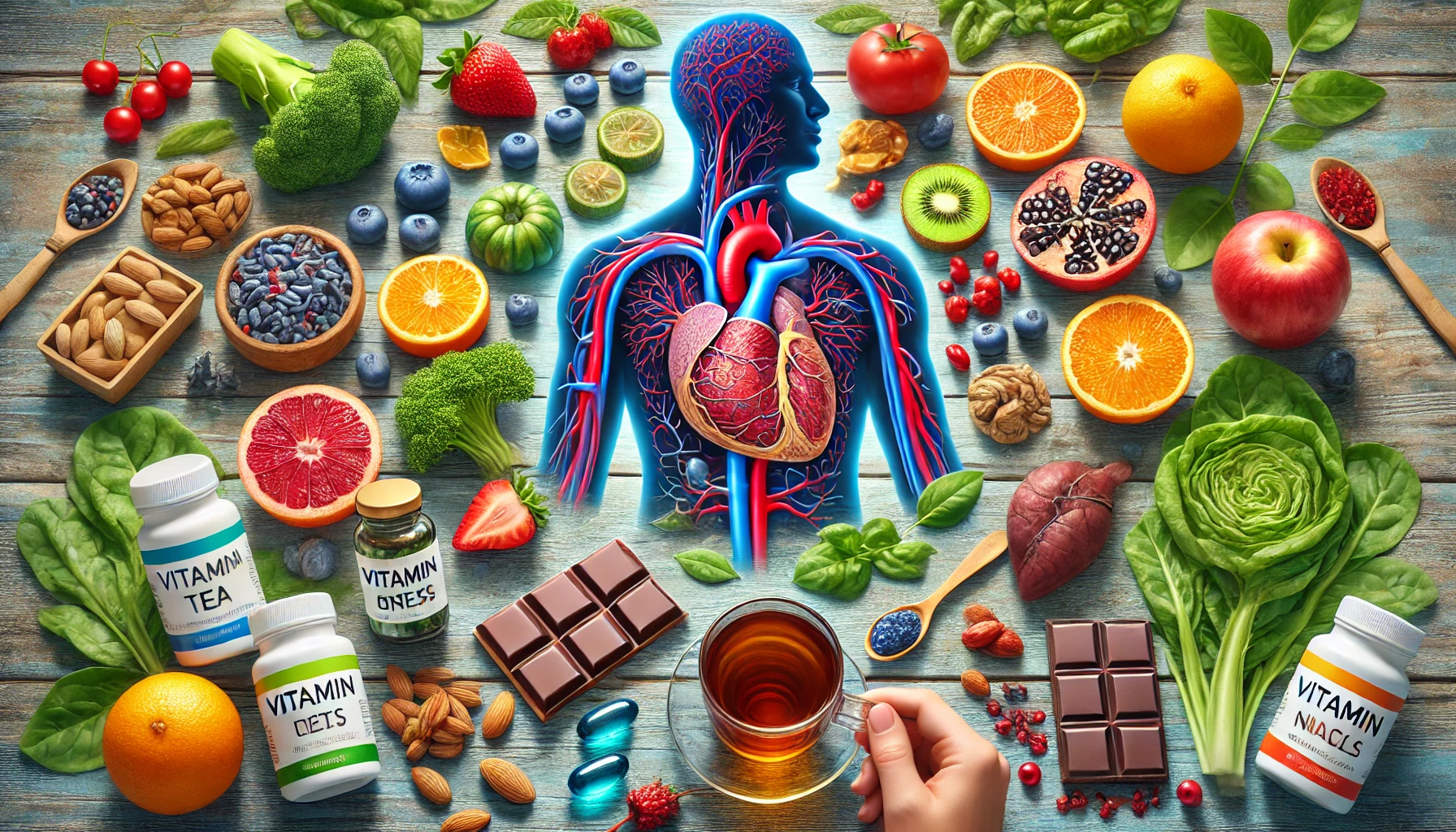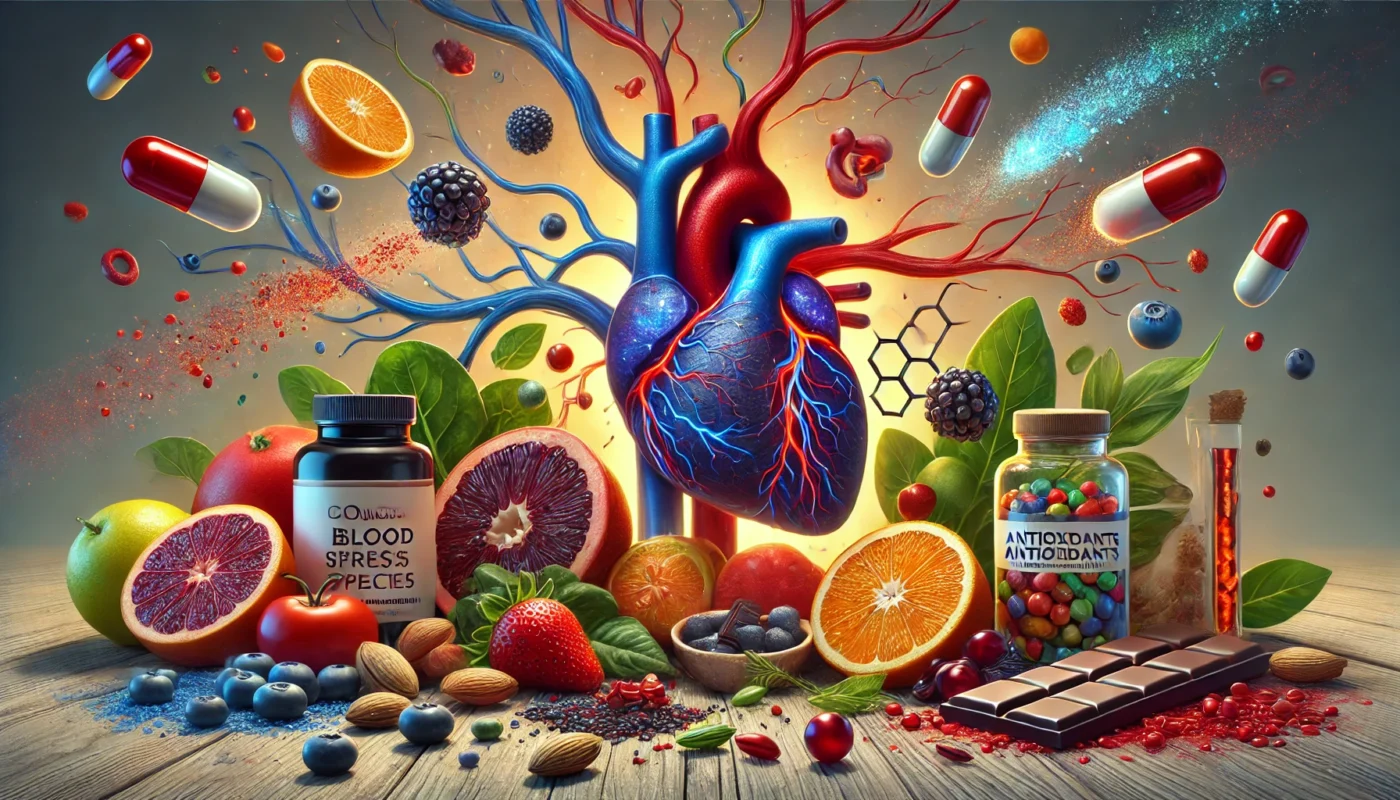Hypertension, or high blood pressure, is one of the leading causes of heart disease, stroke, and kidney failure worldwide. Affecting over 1.28 billion people globally, according to the World Health Organization (WHO), hypertension is often dubbed a “silent killer” because it typically develops without noticeable symptoms. Among the many factors contributing to hypertension, oxidative stress has emerged as a key player in the condition’s progression. Antioxidants, compounds that counteract oxidative damage, are now being explored as potential therapies for managing hypertension.
This article looks into the link between antioxidants and hypertension, examines the evidence supporting antioxidant-based treatments, and discusses how these therapies could complement existing approaches.
You May Also Like: The Role of Magnesium Glycinate in Optimizing Lymphatic Function
Understanding Oxidative Stress and Its Role in Hypertension
What Is Oxidative Stress?
Oxidative stress occurs when there is an imbalance between free radicals—unstable molecules that damage cells—and the body’s ability to neutralize them with antioxidants. Free radicals, also known as reactive oxygen species (ROS), are natural byproducts of cellular metabolism. However, factors such as poor diet, smoking, chronic inflammation, and environmental pollutants can increase their production.
The Link Between Oxidative Stress and Hypertension
Oxidative stress contributes to hypertension through several mechanisms:
- Endothelial Dysfunction: Excessive ROS damage the endothelium (the inner lining of blood vessels), reducing its ability to produce nitric oxide (NO), a molecule essential for vasodilation.
- Vascular Stiffness: Oxidative stress promotes collagen deposition and reduces elastin in blood vessels, leading to increased arterial stiffness.
- Inflammation: Chronic oxidative stress triggers inflammatory pathways that further exacerbate vascular damage.
- Renin-Angiotensin-Aldosterone System (RAAS) Activation: ROS can amplify RAAS activity, leading to fluid retention and elevated blood pressure.
- Evidence: A study published in Hypertension (2015) identified elevated markers of oxidative stress in individuals with uncontrolled hypertension, highlighting the role of ROS in disease progression.

Antioxidants: What They Are and How They Work
Definition and Types of Antioxidants
Antioxidants are molecules that neutralize free radicals, preventing oxidative damage. They can be classified into two categories:
- Endogenous Antioxidants: Produced by the body, including enzymes like superoxide dismutase (SOD) and glutathione peroxidase.
- Exogenous Antioxidants: Obtained from the diet, such as vitamin C, vitamin E, polyphenols, and carotenoids.
Mechanisms of Action
Antioxidants combat oxidative stress by:
- Scavenging Free Radicals: Neutralizing ROS before they can damage cells.
- Enhancing Nitric Oxide Bioavailability: Protecting NO from oxidative degradation, promoting vasodilation.
- Inhibiting Inflammation: Suppressing pathways that lead to chronic inflammation and vascular damage.

Antioxidants and Hypertension: Managing the Condition
Research suggests that antioxidants could play a supportive role in lowering blood pressure and improving vascular health. Below are key findings from studies investigating antioxidant-based therapies:
1. Vitamin C
Vitamin C is a water-soluble antioxidant that supports endothelial function and reduces oxidative stress. A meta-analysis in The American Journal of Clinical Nutrition (2012) reported that vitamin C supplementation reduced systolic blood pressure (SBP) by an average of 4 mmHg and diastolic blood pressure (DBP) by 1.5 mmHg in hypertensive patients.
2. Vitamin E
Vitamin E is a fat-soluble antioxidant that protects cell membranes from oxidative damage. A study in Hypertension Research (2014) found that vitamin E supplementation improved endothelial function in individuals with hypertension, though long-term effects on blood pressure remain inconclusive.
3. Polyphenols
Polyphenols are plant-based antioxidants found in foods like berries, tea, and dark chocolate. They are known for their vasodilatory and anti-inflammatory properties. A randomized controlled trial in The Journal of Nutrition (2010) demonstrated that consuming polyphenol-rich dark chocolate reduced SBP by 5 mmHg in individuals with prehypertension.
4. Coenzyme Q10 (CoQ10)
CoQ10 is a powerful antioxidant that supports mitochondrial function and reduces oxidative stress in blood vessels. A clinical trial in Hypertension Research (2007) showed that CoQ10 supplementation reduced SBP by 11 mmHg and DBP by 7 mmHg in hypertensive patients.
5. Carotenoids
Carotenoids, such as beta-carotene and lycopene, are antioxidants that reduce oxidative stress and inflammation. A study in Nutrition Journal (2017) found that lycopene supplementation significantly lowered SBP in hypertensive individuals.
Antioxidants and Hypertension: Nutritional Sources
Incorporating antioxidant-rich foods into the diet is a practical way to reduce oxidative stress and support blood pressure management. Below are some of the best dietary sources:
Fruits and Vegetables
- Examples: Blueberries, spinach, kale, and sweet potatoes.
- Benefits: High in polyphenols, vitamin C, and carotenoids.
Nuts and Seeds
- Examples: Almonds, walnuts, and sunflower seeds.
- Benefits: Rich in vitamin E and healthy fats.
Beverages
- Examples: Green tea and hibiscus tea.
- Benefits: Contain flavonoids and other polyphenols that improve vascular health.
Dark Chocolate
- Benefits: A rich source of flavonoids, known for their vasodilatory effects.
Reduce blood pressure, support your heart and fight inflammation with Omega-3 Fatty Acids.

Antioxidants and Hypertension: The Role of Nutritional Supplements
While a balanced diet is the cornerstone of hypertension management, supplements can fill nutrient gaps and provide concentrated doses of antioxidants. Below are five supplements supported by research:
1. Magnesium Glycinate
Magnesium promotes blood vessel relaxation and reduces oxidative stress. A study in Magnesium Research (2016) found that magnesium supplementation reduced SBP by 5 mmHg.
2. Omega-3 Fatty Acids
Omega-3s reduce inflammation and support cardiovascular health. A meta-analysis in Hypertension (2018) showed reductions in SBP by 4 mmHg with omega-3 supplementation.
3. Hibiscus Extract
Hibiscus contains antioxidants that promote nitric oxide production. Research in The Journal of Nutrition (2010) found that hibiscus tea reduced SBP by 6 mmHg.
4. Lycopene
Lycopene, a carotenoid, combats oxidative stress and supports vascular health. A study in Nutrition Journal (2017) found that lycopene supplementation reduced SBP significantly in hypertensive patients.
5. Pycnogenol®
Rich in antioxidants, Pycnogenol® improves endothelial function and vasodilation. A trial in Clinical and Applied Thrombosis/Hemostasis (2012) showed it reduced SBP by 7 mmHg and oxidative stress markers.
Challenges and Future Directions
Challenges
- Inconsistent Evidence: While many studies show benefits, others have found minimal or no effects of antioxidants on blood pressure.
- Dosage and Bioavailability: The effectiveness of antioxidants often depends on the dose and the body’s ability to absorb them.
- Long-Term Safety: High doses of certain antioxidants may have pro-oxidant effects, causing harm instead of benefit.
Future Directions
- Combination Therapies: Exploring synergies between antioxidants and traditional antihypertensive medications.
- Personalized Nutrition: Using biomarkers to identify patients who would benefit most from antioxidant-based therapies.
- Advanced Delivery Systems: Developing more bioavailable forms of antioxidant supplements for enhanced efficacy.

Conclusion
Antioxidants offer a promising avenue for the management of hypertension by addressing oxidative stress, a key contributor to the condition. While the evidence is encouraging, antioxidant-based therapies should be viewed as complementary to, rather than replacements for, existing treatments. A diet rich in antioxidant-laden fruits, vegetables, nuts, and teas, combined with targeted supplementation, can support vascular health and blood pressure control. As research continues to uncover the complexities of oxidative stress and hypertension, antioxidants may indeed become a cornerstone of personalized hypertension therapy, paving the way for more effective and holistic approaches to treatment.
References
- Hypertension. (2015). Oxidative stress markers in uncontrolled hypertension. Hypertension. Retrieved from https://www.ahajournals.org
- The American Journal of Clinical Nutrition. (2012). Vitamin C and blood pressure reduction: A meta-analysis. The American Journal of Clinical Nutrition. Retrieved from https://academic.oup.com
- Hypertension Research. (2007). Coenzyme Q10 supplementation in hypertension management. Hypertension Research. Retrieved from https://www.nature.com/hr
- The Journal of Nutrition. (2010). Polyphenols and blood pressure: Dark chocolate study. The Journal of Nutrition. Retrieved from https://academic.oup.com
- Nutrition Journal. (2017). Lycopene supplementation and blood pressure reduction. Nutrition Journal. Retrieved from https://www.biomedcentral.com
Key TERMS for this article:
Hypertension, Oxidative Stress, Antioxidants, Endothelial Dysfunction, Reactive Oxygen Species (ROS), Vascular Stiffness, Nutritional Therapy
Relevant and useful TAGS for this article:
Hypertension, Antioxidants, Oxidative Stress, Blood Pressure, Endothelial Health, Polyphenols, CoQ10, Nutritional Supplements, Cardiovascular Wellness, Natural Remedies
Important Note: The information contained in this article is for general informational purposes only, and should not be construed as health or medical advice, nor is it intended to diagnose, prevent, treat, or cure any disease or health condition. Before embarking on any diet, fitness regimen, or program of nutritional supplementation, it is advisable to consult your healthcare professional in order to determine its safety and probable efficacy in terms of your individual state of health.
Regarding Nutritional Supplements Or Other Non-Prescription Health Products: If any nutritional supplements or other non-prescription health products are mentioned in the foregoing article, any claims or statements made about them have not been evaluated by the U.S. Food and Drug Administration, and such nutritional supplements or other health products are not intended to diagnose, treat, cure, or prevent any disease.

